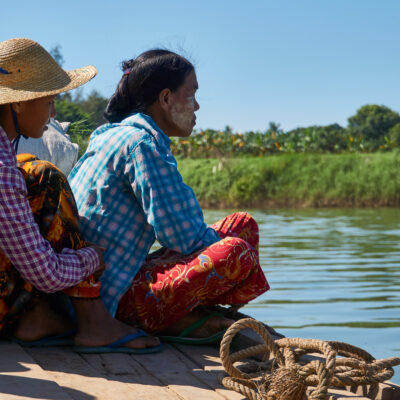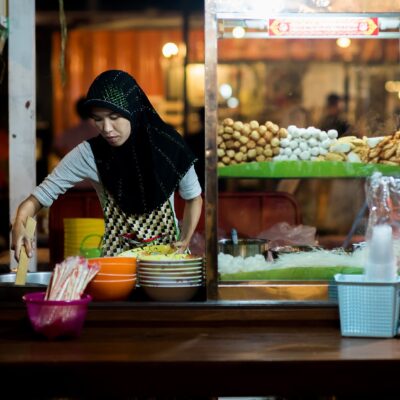Recent calls for greater democratisation and demilitarisation have prompted a multitude of Thai civil society organisations to become more engaged in politics, giving rise to numerous civil society networks that work independently and collaboratively to promote democracy. iLaw and WeVis are some of the most notable of these organisations. Monitoring the general election process and observing the work of Parliament and the government are part of their missions and methods. This article seeks to assess their current accomplishments and challenges.
The history and socio-political background of parliamentary monitoring in Thailand
Since the formal establishment of a constitutional monarchy and parliamentary democracy in 1932, Thailand has experienced an intermittent struggle for political power between the monarchy-military alliance and progressive, democratic forces. Despite the fall of royal absolutism coupled with the establishment of a parliamentary democracy, internal divisions within the progressive democratic forces have provided opportunities for the royalist-conservative elites, supported by the military, to regain their political dominance through three coups d’état in 1947, 1957, and 1958. Since the late 1950s, the monarchy has managed to reinstate its political pre-eminence. Interestingly, instead of reinstating an absolute monarchy, the monarchy-military alliance has chosen to establish ‘the royalist-guided democracy’, officially known as ‘the Democratic Regime with the King as Head of State’.
The reinstatement of royal dominance effectively turned military takeovers into ‘anti-majoritarian veto’ instruments as coups were typically mounted once ‘elected governments begin to promote greater popular participation, expand their authority over matters, such as policy making and appointments, traditionally reserved for officials in the military and civilian bureaucracy.’ This significantly impeded the development of public participation in politics, especially between 1958 and 1992. However, political liberalisation was bolstered due to public uproar over military brutality during the Black May protests in Bangkok in 1992 that were violently suppressed by security forces and police. This was coupled with global trends towards democratisation. Rising demands for democratisation together with the influx of foreign development agencies in Thailand from the 1980s and 1990s led to the emergence and proliferation of civil society organisations. However, these organisations tended to focus on economic and social issues.
With overwhelming public support, the new ‘People’s’ Constitution was enacted in October 1997. It explicitly accommodated greater space for pro-democracy civil society mobilisation. For the first time, Thai citizens were guaranteed the right to propose draft legislation (Section 170) and to file a request to the Senate to remove corrupt politicians from office (Section 304), with the importance of decentralisation and local legislative assembly elections also recognised. Such developments immensely bolstered the sense of active citizenry among broader segments of Thai society. However, the shared political power between state and civil societies significantly shifted the roles and perceptions of civil societies.
From 1990, the government, in response to the backlash of the prior economic boom, began to address social concerns such as rural poverty in the national development plan and appointed various civil societies as government consultants. Some civil society organisations saw themselves as working within government, while others adopted alternative approaches and focused their efforts on building grassroots networks in rural and underdeveloped areas. The 1997 Constitution also created various independent institutions and committees as guardians of the Constitution. These public yet independent organs took on some aspects of parliamentary monitoring, such as investigating the corruption of politicians. In the 2000s, representatives from civil society organisations were frequently consulted by political parties to assist in developing the parties’ political campaigns; and involvement in policymaking appeared to be more attractive than parliamentary monitoring.
However, frustrated by the stronger liberal forces emerging after 1997, royalist-conservatives staged two military coups in September 2006 and May 2014 to reinforce the political pre-eminence of the Democratic Regime with the King as Head of State.
Other notable techniques deployed for this purpose included manipulation of election outcomes, the implementation of the junta-made 20-year National Strategic Plan on security, economic and environmental issues (among others), and the escalation of lèse-majesté charges against pro-democracy activists. Since 2006, a cycle of coups and constitutions has rendered any efforts at parliamentary monitoring, whether through public independent institutions or civil societies, meaningless, if not impossible. In recent years, however, there have been more fervent anti-establishment demands, even calls between 2020 and 2021 for reform of the monarchy.
Recent political mobilisation has resulted in the emergence of new pro-democracy civil society organisations, notably iLaw (a non-governmental organisation that seeks to promote democratisation, freedom of expression, citizen engagement in politics; and a fair and transparent justice system) and WeVis (a civic technology group aiming to empower people through technology and open data).
Overview of current Thai PMOs
The current practice of parliamentary observation in Thailand encompasses diverse stakeholders and methods. The primary observers are citizens who watch parliamentary proceedings broadcast online and engage in public debate through social media. Since the first day of the parliament after the 2019 election (the first since the 2014 coup), hashtags related to parliamentary meetings have frequently appeared on Twitter (now X) on important events, such as the vote to reverse the legal effects of an emergency law passed by the military government after the 2014 coup and the selection of the head of parliament in 2023. Amidst this political dynamic, the main opposition party used data relating to controversial issues in parliamentary debates and this fueled the public’s digital engagement through public discussion and the production of memes and clips of parliamentarians’ performances.
Mass media outlets and scholars play pivotal roles in reporting and analysing what’s happening in the parliament. However, closer monitoring has been done by international and local non-governmental organisations, including civic tech, by traditional research and advocacy to more innovative approaches leveraging technology and data analysis. For example, some organisations actively monitor instances of corruption or irregular behaviour among politicians and related officials and provide interactive databases, holding them accountable and helping ensure ethical governance.
Civil society organisations advocate for specific causes by submitting recommendations and petitions, participating in sub-committees and plenary meetings to influence policy decisions directly. These campaigns help make parliamentary debates and proceedings more comprehensible, and encouraged a rise in public comments on legislative matters through official channels.
However, until 2024, among more than 100,000 civil societies in Thailand, there were no organisations specifically focused on ‘watching’ parliament.
The work of iLaw and WeVis
iLaw and WeVis are the closest to PMOs. They have been involved in various aspects of parliamentary observation work, ranging from elections, parliamentarians’ work backgrounds, their votes on proposed legislation, the progress of proposed legislation, budget tracking and the relationship between parliamentarians and businesses. Their work is partially done by other organisations, but with less frequency and consistency.
Though both work with data analysis, their outputs play different roles. iLaw’s contribution mainly focuses on the understanding of complex legislative processes and details of substantive arguments relating to controversial bills. WeVis makes data available and visualises a bigger picture, allowing people to engage with data directly.
Table 1: How some Thai civil societies engage with parliament

iLaw
Founded in 2009 by a former Senator, iLaw’s English name, ‘Internet Dialogue on Law Reform’, shows its starting point was as an organisation that uses the internet to empower the proposal of draft legislation. iLaw’s work on freedom of expression became prominent in 2011 due to the enactment of the Computer Crime Act and the rise in enforcement of the lèse-majesté law; both of which restrict freedom of expression and public political participation. In response to repressive laws resulting from the 2014 coup, iLaw has focused even more on freedom of expression and democratisation.
iLaw’s strategies focus on encouraging deliberate public participation on social reform. It is skilful in using social media to spark discussion about controversial bills and to mobilise public participation in election monitoring and protest observation. What sits behind these campaigns, which have received wide participation, are long-standing efforts to create online public knowledge of legislative and judicial systems.
In 2019, iLaw and partner organisations submitted a bill petitioned by the general public to parliament , aimed at ‘undoing’ the effects of the 2014 coup, but it was dismissed in 2021 together with another version proposed by an opposition party. If passed, the bill would have declared the takeover void and imposed criminal sanctions on its leaders. Later, iLaw-led the #ConforAll campaign, which called for parliament to amend the 2017 Constitution to facilitate drafting a new Constitution. The campaign t, was endorsed by almost 100,000 eligible voters. iLaw’s recent online articles address issues related to a new Senatorial selection system as well as flaws in the current junta-installed 2017 Constitution. In 2024, despite several legal obstacles, iLaw and its partners launched a campaign to make more information available relating to the Senate appointment process and increase public observation of Senatorial selection.
WeVis
WeVis is a civic technology organisation that aims to enhance public awareness of democratic participation using open data technologies. Inspired by platforms such as TheyWorkForYou and GovTrack, it gathers and assesses related data ‘to make democracy more open and more transparent.’ It uses data storytelling and visualisation to explain complex or not well-understood issues such as the changes in new election system. Much of WeVis’ work is based on information and analysis from iLaw, such as articles based on data assessing the benefits and drawbacks of Thailand’s voting systems between 1997 and 2023. After the election, it also employed this technique to inform the public about the national fiscal budget allocation.
In the run-up to the general election in May 2023, together with partners including iLaw, Hand and 101Pub, WeVis provided a combination of interactive tools for the public to explore parliamentary data to inform their voting decisions, including information on candidates, policies offered by different parties, a political promise tracker and bill tracker. One of the most creative tools is ‘MP Design’, which displays the current parliamentarians according to users’ selected preferences of politicians’ characteristics. This tool not only allows people to explore candidates’ qualifications and experience but also urges them to notice their biases and understand others’ preferences.
In 2024, informed by feedback from its stakeholders (voters, parties, parliamentary officials, media and academics), WeVis launched a comprehensive platform called ‘ParliamentWatch’ showing up-to-date data on parliamentarians such as their education and work backgrounds and votes on proposed legislation. This platform aims to monitor bills and each individual parliamentarian’s performance and track the promises of political parties. WeVis has become a PMO whose main priority is its work with parliament and advocating for the right to information and collaborative data sharing.
Current contributions to policymaking activities and limitations
It is clear that PMOs’ work in Thailand after the 2014 coup has raised public awareness and fuelled political participation especially during 2019 and 2023 elections. For example, a report by the ANFREL following the 2023 elections noted the ‘visibility’ of civil society organisations, including iLaw, in promoting democracy.
PMO’s have also influenced important specific proposed legislation such as constitutional amendments. The defects of the 2017 Constitution prompted iLaw together with WeVis and other partners to advocate for the constitutional change in the campaign called #ConforAll., which, as mentioned above, was unsurprisingly rejected. However, the campaign mobilised further calls for parliamentary reform. In response to these public demands, in October 2023 the current government established an ad hoc committee tasked with studying the possibility of amending the 2017 Constitution.
Government transparency has been a development goal in Thailand since 1997 when the Official Information Act was introduced. Though the Digital Government Agency was also established in 2018, the level of open data and open government in Thailand is still limited. The use of data and machine learning in PMOs’ has also contributed to changes in open data and government policy. PMOs’ proactive use of data, evident in the rapid increase of both online and physical interactions in various campaigns, urged government agencies to release more data.
However, civil society organisations still struggle to access public information for their campaigns and advocacy. Many requests for data under the Official Information Act are denied or delayed. Several civil society organisations have called for the improvement of data governance and open data standards in parliamentary work.
Also, data quality and machine readability are still a significant obstacle to parliamentary observations in Thailand. Some data, such as national budget documents, election vote count data and political asset declarations, are still in PDF form or even in handwriting. To operate the ‘ParliamentWatch’ platform, WeVis retrieves data periodically from the parliament and processes them manually, utilising open-source OCR tools and crowdsourcing digitalisation tools. A collaborative effort between civil society organisations and parliament to build a data portal is still underway.
PMOs in Thailand continue to operate in a very difficult political environment. Despite growing demands for democracy and the rise of pro-democracy civil society organisations, the royalist-conservative faction was able to manipulate the 2023 election outcome, largely through the anti-majoritarian veto power articulated in the junta-made 2017 Constitution. The presence of the junta-picked Senate, consisting of 250 members, allowed it to exert influence over the choice of prime minister. Unlike other parliamentary systems, the appointed Senators were allowed to join with MPs of the House of Representatives to select the prime minister (Section 272). Although the anti-junta parties secured victories in the general elections in 2019 and 2023, the Senate’s votes enabled the military-endorsed candidate to assume the position of Prime Minister. Additionally, the implementation of the junta’s 20-year National Strategy Plan has resulted in the preservation of the 2014 junta’s political influence until 2037. Failure of future governments to comply with it could lead to impeachment proceedings.
In recent years, the Thai government has attempted to curb the activities of non-profit organisations (NPOs). A draft bill aimed at banning NPO activities that might cause ‘social disruption’ passed the cabinet in 2022 and could proceed to parliamentary deliberation under the current government. Despite efforts to pass an anti-SLAPP (Strategic Lawsuit Against Public Participation) bill, the use of SLAPP) has continued, with governmental agencies and big companies targeting activists. Moreover, international funding for Asian civil societies in the political rights domain is decreasing due to humanitarian crises in other regions.
Recommendations
We have two main findings:
- Thai PMOs have tried many strategies to work under repressive environment
- Data and digital tools (including social media) are powerful and their use will become more widespread.
Therefore, we recommend more partnerships between Thai civil societies and regional PMOs to pressure government to be more open and for more collaboration with government and political parties on data collection and publication.
Other civil society organisations can learn from and partner with iLaw and WeVis in relation to their parliamentary monitoring work (which could also help develop effective outreach to media and support their other public campaigns). This kind of broad coalition among civil societies and media to conduct different aspects of parliamentary observation exists in the African region. Engagement with other PMOs in the Asian region to draw on international open parliament standards, benchmarks, and assessment tools may also increase incentives for more collaboration with parliament and related governmental agencies. This is an important part of efforts to create structural change in governmental data governance.
The use of data and digital tools to improve the transparency of information has become widespread and will continue to grow. WeVis has already adapted become a holistic PMO. However, willingness and commitment of the Thai government to work with, rather than against, pro-democracy civil society organisations is needed. An open and welcoming environment, including opening up the physical space of the parliament, is also essential to build a culture of political participation. The continuity of data sharing between parliament and PMOs would be secured, for example, by establishing a long-term legal mandate under the constitution in relation to making more information public. Direct engagement between PMOs and political parties could also be helpful, but PMOs should follow best practices to maintain independence and ensure their creditability.
Authors:
Thitirat Thipsamritkul is a lecturer at Faculty of Law, Thammasat University. She is advisor and former chair of Amnesty International Thailand. Her specialisations include international human rights law, digital law and internet governance.
Rawin Leelpatana is an assistant professor at Faculty of Law, Chulalongkorn University. His specialisations include jurisprudence, constitutional law, and constitutional theory.
Suprawee Earn Asanasak is a PhD candidate at Melbourne Law School, University of Melbourne and a lecturer at Faculty of Law, Thammasat University.
Image: The Senate67 campaign to promote more transparency in senatorial elections. Chiang Mai region, May 2024. Credit: Prachatai/Flickr.




